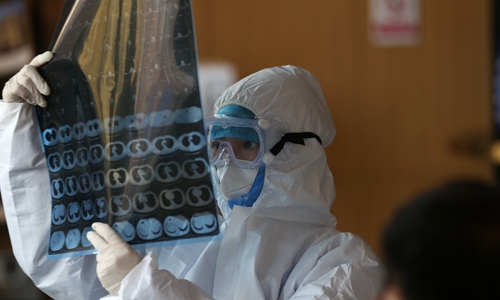HOME >> CHINA
Medical personnel infections with novel coronavirus declining
By Wang Qi Source:Global Times Published: 2020/2/17 19:33:40

A doctor checks the chest X-ray of a patient suspected of having novel coronavirus on Monday at an isolation station of a residential community in Hongshan district in Wuhan, the epicenter of the novel coronavirus outbreak. Photo: Cui Meng/GT
Public concern rose again after a 59-year-old Wuhan-based nurse died of coronavirus infection on Saturday.
Frontline doctors, nurses and experts reached by the Global Times noted that the infection of medical staff is on the decline in Wuhan and Hubei Province, but that does not mean other regions should take it lightly.
China's health authority on Friday confirmed at least 1,716 medical personnel were infected with the novel coronavirus pneumonia and six died from it. More than 1,500 infection cases were in Hubei, the epicenter of the outbreak.
Hu Bijie, a member of China's top expert mission for medical treatment for COVID-19, told the Global Times on Monday that medical staff infection is declining, especially after a range of measures were taken, such as the setting up of separate fever clinics and isolation wards, and the universal use of protective equipment.
Hu said most of the infections among medical staff occurred in the early stage of the epidemic, when people did not know the virus can be transmitted during the incubation period, and cheap and efficient test kits were not commonly used.
A postgraduate student who requested anonymity and has interned at Wuhan-based ?Tongji Hospital's infections department told the Global Times on Monday that the infection of medical staff was caused by carelessness in the early stage and was aggravated by a lack of medical supplies such as N95 masks, protective outfits and goggles.
China's top epidemiologist Zhong Nanshan confirmed the people-to-people transmission on January 20. Before that, Wuhan health authorities denied people-to-people transmissions on January 5, which analysts believe has misled residents and doctors and contributed to cross-infection.
"We missed the perfect time to curb the infection without a correct understanding of the virus and proper voice to public. The outbreak due to cross-infection then caused a severe shortage in medical resources and escalated the danger to medical staff," said the postgraduate, who was asked to leave the frontline two days after Zhong's warning.
Zhou Yanfang, who works at the equipment department of Zhongnan Hospital in Wuhan, told the Global Times on Monday that things are getting better as they have received adequate protective equipment from the government and the public since late January, and medical supplies are distributed timely to hospitals.
Most cases of medical staff infection were in Hubei. In Beijing, at least three doctors were infected and quarantined as of late January.
The Beijing government has ordered all grade-II and III hospitals to cancel non-emergency onsite registration and replace it with apps, hotlines or online appointments.
According to reports, infected medical staff are not only in respiratory departments, other departments like ophthalmology, neurosurgery, gynecology and hepatology also have personnel infected.
A public health expert was optimistic about curbing medical staff infection, but warned that big cities like Beijing and Shanghai should stay alert.
"Control measures in Beijing are not as strict as in Wuhan, and many top doctors in Beijing have gone to Hubei to support the epicenter, leaving the city to face a severe challenge in preventing wider infection," the expert told the Global Times.
Posted in: SOCIETY